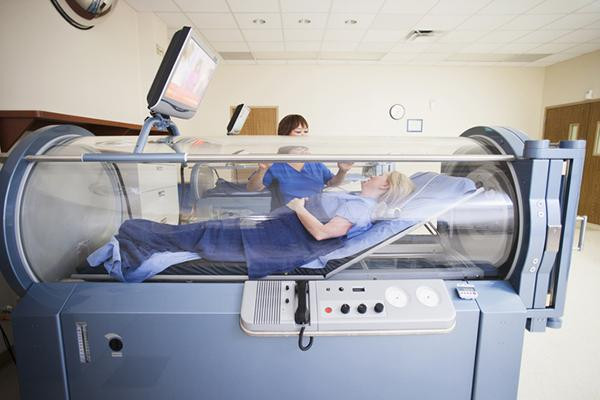Tuberville’s Flawed Attempt to Address Veterans’ Mental Health through Unfunded Program
In the light of the approaching Veteran Suicide Prevention Awareness Month, it seems that Senator Tommy Tuberville (R., Ala.) is turning his attention towards those veterans who are burdened with traumatic brain injury (TBI) and post-traumatic stress disorder (PTSD). His proposed method of alleviating their suffering? He’s looking at alternative treatment forms of care such as Hyperbaric Oxygen Chamber Treatment (HBOT). Now that’s an approach that surely raises eyebrows.
The Alabama Senator’s ‘Veterans National Traumatic Brain Injury Act’ is aimed at kick-starting a three-year pilot program within the Department of Veterans Affairs (VA). This program would facilitate veterans diagnosed with TBI or PTSD to receive HBOT at two distinguished Veterans Integrated Service Networks (VISNs). An intriguing proposition, but one must wonder how this program will be funded.
Tuberville’s bill provides an interesting solution. It prescribes creating a general fund at the Department of Treasury to implement this unique pilot program. The catch? The funding should be derived from donations accumulated by the Secretary of the VA. The bill also includes a provision for the Comptroller General to offer an up-to-date report on HBOT research. Funding healthcare through donations, now that’s an unusual financial model to consider.
“We need to explore alternative treatment options for our veterans,” remarked Tuberville. One would think that scars from war that aren’t physically visible would have been given due attention and remedied long ago. Offering veterans who have exhausted all options access to HBOT treatment could potentially bring about a significant, positive turning point in their lives. However, the question remains: is it *this* treatment that they desperately need?
In the House of Representatives, curiously enough, the same bill has achieved considerable success. Of course, it’s no secret that Senator Tuberville, a member of the Senate Committee on Veterans’ Affairs, has consistently shown an apparent fervor for America’s veterans. Following this trend, he introduced similar bills such as the Supporting Families of the Fallen Act and even another bill to make the Post-9/11 benefits easier to access for service members and their families. The real question here is how effective these measures have truly been?
Keeping up with his Senate counterpart, Rep. Greg Murphy (R., N.C.) brought a matching bill to the table. His bill was gracefully transitioned through the House Committee on Veterans’ Affairs. However, let’s not turn a blind eye to the sobering fact that 17 veterans, or perhaps even more, tragically take their own lives every day.
Murphy claimed, “PTSD and traumatic brain injuries are a common occurrence among veterans, more than most people realize.” He considers Hyperbaric Oxygen Therapy a beacon of hope for veterans struggling with PTSD/TBI and for whom other treatments have done very little. It’s alarming that our veterans need ‘a lifeline’, suggesting that the existing healthcare systems have let them down.
Murphy was quick to add another point in favor of HBOT. He stated, “The therapy has undergone thorough testing and enjoys a strong evidence base, not just in the U.S. but even in other countries, such as Israel.” While this may bear accuracy, why hasn’t it been adopted as a mainstream treatment option till now? These are the questions that deserve answers.
Despite significant pushback, Murphy reminded everyone that the last Congress saw great progress with this issue. He even declared his intention to continue his fight to make thie treatment accessible for all of America’s veterans. We see a pattern here, don’t we? The word ‘fight’ used so loosely when referring to the well-being of our veterans, it gives one pause.
Nevertheless, these staunch politicians should realize that providing alternative treatments such as HBOT might be a solution, but what problem does it exactly solve? We may wonder if it is distracting everybody from focusing on the root cause of the issues that our veterans face. These issues may not be cured by treatments alone; they need an all-encompassing systemic change.
We should continue to scrutinize these apparent ‘champions of veteran’s welfare.’ Are they really making changes that are in the best interests of the veterans? Or, are they just using this issue to fortify their political image while the veterans continue to struggle?
What these politicians fail to see, or perhaps willfully ignore, is the glaring issue at hand. Each day we lose veterans to suicide, and the solution isn’t just alternative treatments. The problem is much deeper, born from issues like dire financial situations, lack of emotional support, and a broken health system that fails time and again.
While they’re busy introducing bills and claiming alternate treatments can help veterans with PTSD/TBI, the real problem remains unsolved. The government should be addressing systemic issues that lead to such disorders in the first place. Instead of placing band-aid solutions and diverting attention with HBOT treatments, let’s focus on the root of this healthcare conundrum.
So, while it may seem like a step forward if alternative treatments for veterans become a reality, let’s remember it still leaves unanswered questions. Is it helpful to our veterans, really? Or is it just another viable soundbite for a politician’s reelection campaign? Only time will tell.



